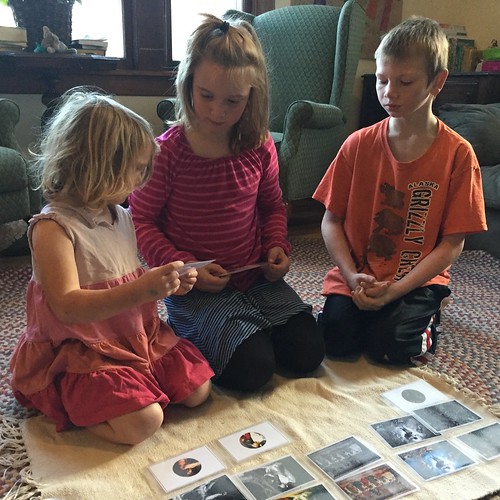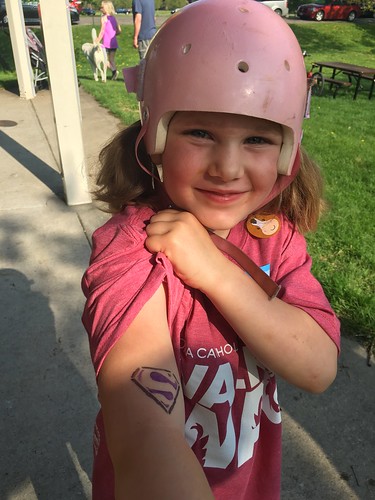Montessori is an important part of the fabric of me. Many things I do as a parent are influenced by the internalization of Montessori beliefs about childhood. That said, I know that occasionally children with certain temperaments, needs, developmental issues, or more may NOT do best in a pure Montessori setting. Not that Montessori can’t be used to meet them where they are, but that the methods as written are not in line with that child.
For a child with manual dexterity (fine motor) issues, for example, the golden bead materials can be very cumbersome. They might do better with a different material, a helper to work with the materials, or even no materials. On the other hand, the same limited motor skills would be supported in maximizing the child’s capacities through the sensorial and practical life activities that strengthen the hand. These are all things a trained and experienced Montessori classroom guide would automatically work through, but something that is a little harder in the home setting.
I haven’t done a lot of Lucie updating in this space since her health issues this winter. There are a lot of reasons for that, including the fact we don’t really have answers or know what the future holds and that I do want to protect her privacy to a certain degree. (I’m also absurdly busy managing her care and needs- it’s a lot!) Today, however, I want to talk a little bit about what I’ve observed of Lucie and some of the hesitations I was having about continuing with Montessori and homeschooling for her (and the surprise person that changed my mind).
First of all, Lucie has been doing much better seizure-wise for the last several months. Maybe it is the fresh air of summer, maybe it is finally the right combination of medications, the ketogenic diet, or just plain dumb luck. In any event, she has only had a couple isolated seizures since late April. This is a fantastic answer to our prayers!
At the same time, however, we have been noticing all of the trickle down effects of 7 months of extremely regular seizures. Our brains are amazing, but they can only take so much, you know? Her motor skills, speech, cognitive abilities, memory, and executive functioning have all been a little fried!
A few weeks back, she was trying to crack eggs for dinner except she couldn’t remember how. Which side did she crack? How did she open it? Put it over the bowl before opening it- this is apparently optional. Every step had to be broken down, broken down further, and still supervised. When I turned around she forgot the whole process.
The Montessori principle of using breakable dishes with young children holds that they will, naturally, break some dishes but in the course of their mistakes will learn to be careful and gentle. Only, sometimes Lucie’s hands just open too soon or accidentally and what she is carrying falls. Not because she was failing to be careful enough, but because they just plain stopped communicating with her brain.
Everything I am observing tells me that, while Lucie will be six in just a few months, rather than transitioning to the second plane of development we will be hanging out with early sensorial and practical life for a while as a form of rehab and reinforcing brain connections through heavy work. (I’m still undecided about those breakable dishes…)
What I was feeling much less confident about, is what to do with her academically. Due to executive functioning and memory loss (and seizures of course!), she needs pretty full time supervision. The other day she calmly got out of the van, walked around the house to the grill, and turned on all the knobs! Transition periods are often like this and have more than once ended in finding her somewhere we thought she couldn’t get to. That’s a lot of supervision to provide all day while also providing for our home and educating my other children- particularly for a parent who’s default is to maximize independence as the norm.
Lucie kind of needs a full time helicopter right now for her own safety.
The reason for all of these issues is (to the best of my understanding) that she had (and has) a lot of disruption along the paths that are usually used in the brain to communicate these things. We can practice and make the same brain paths smoother, but Lucie is constantly forging new paths for old skills. Because the seizures affect her whole brain, paths that were clear one day may be blocked the next. Her nuero-psychologist described it as a brick of swiss cheese with different holes every day. Some days have relatively few holes and conversely, in Tim’s words, some days there isn’t a lot of cheese!
But what to do about it?
I had almost convinced myself that I couldn’t homeschool her. Even convinced myself that she would be better not with us (certainly the schools all think that). I figured that the answer might be more drill and practice, flash cards, and traditional learning methods. I wanted to keep her with us, but I just felt like this was out of my league and at the very least I might need a new approach.
Oh me, of so little faith.
It turns out, according to Lucie’s nueropsych, that what Lucie needs most is exactly what I’ve been doing all along.
According to Dr. B., Lucie is struggling to process visual information. Take cracking an egg, for example – most kids are able to pick up that procedure from observing. Think of every two-year old you’ve ever known trying to mimic mom’s cleaning or her exercise routine! For Lucie, that’s not enough, even for seemingly simple tasks. She will do better with the spelled out steps and consistent procedures. She may need supports like broken down instructions (verbal and/or pictoral- likely both), but she needs the exact motions and patterns. But she needs it for everything and she can’t cancel out other background visual noise very well, so a busy kindergarten classroom would be an extremely restrictive environment for her.
The other place Lucie is currently struggling cognitively is in the signs and symbols. If you ask her how old she is, for example, she will show you a whole hand and then whisper to the closest adult “How many is that again?”. She was repeatedly able to answer questions like “Which picture starts with the ‘c’ (sound)?” But struggled to recall even the few letters and numbers she knows.
I asked if more traditional methods (think flash cards and direct instruction reading) would help. Dr. B.’s answer- a clear nope! Anytime I can put the sound or quantity in her hands it is going to allow her to communicate what she knows without relying on the symbols that are tripping her up. See, Montessori allows us to more accurately assess what Lucie knows and can do and allow her to work further, without holding her back on things that are more challenging.
Mind blown.
Not only did she tell me the best thing to do is homeschool, but she told me the best way would be to continue as much Montessori as humanly possible. Since that’s pretty much all we do in preschool and kindergarten- that’s not problematic at all!
But there’s more Montessori magic.
As we were getting in the car after the appointment, Tim says to me, “You know what this means, right?”
(I didn’t- Leave it to the guy with all the letters after his name.)
It means that she’s stuck on abstraction. The numbers and letters are the abstraction. It means that she did lose skills and she is behind and there are other issues, but you know exactly where to go back. Go back to before abstraction in everything and that’s where you start. Spindle boxes and number rods, stuff you’d never do with a six year old if you didn’t have this information. That’s what you do. Again and again and again.
And it means that thanks to Montessori, you are going to be able to take her that much further, especially in math, without relying on abstraction at all.
Super Magic for Super Lucie.



<3 this. Great update. It's making me want to learn more Montessori.
This is amazing. YOU are amazing, my friend! She is exactly where she should be. (And Tim is a super-dad!)